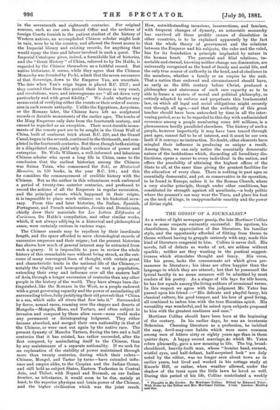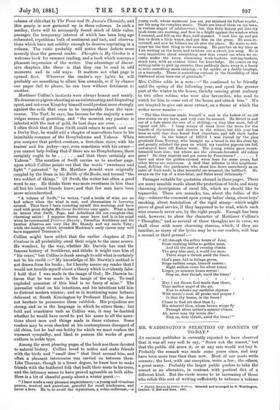THE GOSSIP OF A JOTJRNALIST.* As a writer of light
newspaper gossip, the late Mortimer Collins was in some respects eminently successful. His egotism, his cheerfulness, his appreciation of fine literature, his familiar style, and the opportunity afforded of flitting from theme to theme without having to grapple seriously with any, made this kind of literature congenial to him. Collins is never dull. His novels, full of defects as works of art, are seldom without sparkle ; neither are they wanting in the poetical suggest- iveness which stimulates thought and fancy. His verse, like his prose, lacks the consummate art which gives per- manence to literature ; his ideas are often happier than the language in which they are uttered ; but that he possessed the lyrical faculty in no mean measure will be admitted by most readers of his poetry. As a singer of idle lays for idle hours, he has few equals among the living authors of occasional verses. In this respect we agree with the judgment Mr. Yates has passed upon his friend :—" His delicate and playful fancy, his classical culture, his good temper, and his love of good living, all combined to imbue him with the true Horatian spirit. His versatility was wonderful, and he seized upon subjects proposed to him with the greatest readiness and ease."
Mortimer Collins should have been born at the beginning of the century. In his earlier days, he was an inveterate Bohemian. Choosing literature as a profession, he imbibed the easy, devil-may-care habits which were more common among men of letters sixty or eighty years ago than in these quieter days, A happy second marriage, to which Mr. Yates refers pleasantly, gave a new meaning to life. The big, broad- shouldered, heavily-built man, whose "leonine head, earnest, wistful eyes, and half-defiant, half-surprised look" are duly noted by the editor, was no longer seen about town as in earlier years, but lived and worked in his cottage study at Knowle Hill, or rather, when weather allowed, under the shadow of the treed upon the little lawn he loved so well. During this period of his life, Collins contributed a weekly
* Thoughts in My Garden. By Mortimer Collins. Edited by Edmund Yates. With Notes by the Editor and Mrs. Mortimer Coffins. 2 vols. London t Bentley and Son.
column of chit-chat to The Press and St. James's Chronicle, and this gossip is now garnered up in these volumes. In such a medley, there will be necessarily found much of little value, passages the temporary interest of which has been long ago exhausted, repetitions both of sentiment and fact, and observa- tions which have not solidity enough to deserve reprinting in a volume. The critic probably will notice these defects more severely than the general reader. Thoughts in My Garden is a welcome book for summer reading, and a book which conveys a pleasant impression of the writer. One advantage of discur- sive chapters like these is that they can be read in odd moments and in odd ways. It matters not what page is opened first. Wherever the reader's eye lights he will probably see something to allure him onwards, or if by chance one paper fail to please, he can turn without detriment to another.
Mortimer Collins's instincts were always honest and manly.
He denounces pigeon-shooting as an uninteresting and disgusting sport, and not even Kingsley himself could protest more strongly against the evils that seem to be inseparable from the race- course. The Turf, he says, has become for the majority a mere vulgar means of gambling, and "the moment any pastime is infected with the lust of gold, its best days are over I often think that if Dean Swift could return to earth and see a Derby Day, he would add a chapter of marvellous force to his inimitable romance of the Houyhnhnms and Yahoos. When
you compare that perfect creature, a first-class racer, with his trainer and his jockey—aye, even sometimes with his owner—
you cannot help feeling that if there are no Houyhnhnms, there certainly ought to be and that there certainly are Yahoos." The mention of Swift carries us to another page, upon which Collins points out that the words "sweetness and light" " patented " by Mr. Matthew Arnold were originally coupled by the Dean in his Battle of the Books, and termed "the two noblest of things." Of Swift, the writer has often a good word to say. He thinks there was more sweetness in him than all but his inmost friends knew, and that few men have been more misunderstood.
"A volume of Swift," he writes, "and a bottle of wine are no bad solace when the wind is east, and rheumatism is hovering around. Thus have I been consoling myself this morning, and have read with great delight Martinus Scriblerus over again. What a loss 'to letters that Swift, Pope, and Arbuthnot did not complete that charming satire ! I suppose Sterne must have had it in his mind when be commenced Tristram Shandy; Cornelius Scriblerus and his brother Albertus are very like Mr. Shandy and my uncle Toby ; while the mishaps which attended Martinus's early career may well have suggested Tristram's."
-Collins might have added that the earlier chapters of The .Caxtons in all probability owed their origin to the same source. He wonders, by the way, whether Mr. Darwin has read the famous history of Scriblerus, and thinks it might cure him of "his craze," but Collins is frank enough to add what is certainly not to his credit :—" My knowledge of Mr. Darwin's method is not drawn from his books ; for I hereby assure my reader that I -would not trouble myself about a theory which is evidently false. I hold that I was made in the image of God ; Mr. Darwin be- lieves that he was made in the image of the ape. To read exploded nonsense of this kind is no fancy of mine." The journalist relied on his intuitions, and his intuitions told him to distrust modern science ; and so in mentioning some lectures delivered at South Kensington by Professor Huxley, he does not hesitate to pronounce them rubblish. His prejudices are strong, and so is the language in which he utters them; but 'bold and sometimes rash as Collins was, it may be doubted whether he would have cared to put his name to all the asser- tions about men and things made in these volumes. Some readers may be even shocked at his contemptuous disregard of old china, but he had one hobby for which we must confess the 'warmest sympathy, and liked to possess the works of great authors in noble type.
Among the most pleasing pages of the book are those devoted to natural history. Collins loved to notice and make friends with the birds and "small deer" that lived around him, and often a pleasant intercourse was carried on between them. Like Thoreau, though in a lesser degree, he knew how to make friends with the feathered folk that built their nests in his trees, and the intimacy seems to have proved agreeable on both sides. Here is a bit of cheerful gossip about a winter guest :—
"I have made a very pleasant acquaintance,—a young and vivacious person, musical and garrulous, grateful for small kindnesses, and never a bore. He is, to avoid the mysterious, a robin-redbreast,—a young cock, whose waistcoat has not yet attained its fullest scarlet, nor his song its complete music. There are lots of them on my lawn, in various stages of adolescence ; but this little beauty got into my book-room one morning, and flew in a fright against the window when I entered, and fell on the floor, half-stunned. I took him up, and got him to drink a little water, and put him on the grass. He soon re- covered, and now he follows me all over the place. He waits to wel- come me the first thing in the morning. He perches on my knee as I sit writing on the lawn, and twitters out a sweet, low song. He is very inquisitive about everything new that comes out when we en- camp under the trees, examining work-baskets, writing-baskets, straw hats, with an evident thirst for knowledge. He comes on my writing-table to pick up crumbs, then suddenly darts away in a burry to seize something more enticing,—a fat spider, or a daddy longlegs, or a butterfly. There is something curious in the friendship of this feathered atom born out of gratitude."
Mrs. Collins adds in a note :—" He continued to be friendly until the spring of the following year, and spent the greater part of the winter in the house, thereby causing great jealousy to two other robins, who were also favourites, who used to watch for him to come out of the house and attack him." We are tempted to give one more extract, on a theme of which the writer never wearies :—
"The blue titmouse made himself a nest in the hollow of an old tree-stump on my lawn, and very cosv he seemed. He flitted in and out of a hole about the size of a shilling,—a tiny blue atom, fall of vigour and life. I hang scraps of meat from the trees for the benefit of the tomtits and titmice in the winter, but this year has been so mild that they found food elsewhere, and left their larder untouched. In the winter of 1872-3 I was visited by the pine grosbeak from Norway, who brought up a brood in the firs close by, and greatly relished the peas on which my tumbler pigeons are fed, and stayed here till Easter week. The young robins grow russet. breasted here also ; but where are the crimson-breasted old robins
gone ? Do they migrate and get eaten by Frenchmen ? have not seen the golden-crested wren here for some years, but other wrens are numerous. A bird that adheres to this neighbour- hood, defying the gardeners, who shoot him down mercilessly as an eater of fruit-buds, is that beautiful air-minstrel, the bullfinch. He sways on the top of a rose-briar, and flutes away deliciously."
Passages suitable for quotation abound in these pages. There are many sensible words about the protection of birds, and many charming descriptions of rural life, which we should like to transcribe. There are remarks, too, about the follies of the day—witness the comment upon young ladies' slang, about boys' smoking, about teetotalism of the rigid stamp—which might prove of good service, if they happened to be read, which such wise counsels never are, by the right people. Enough has been said, however, to show the character of Mortimer Collins's "Thoughts," and as several of these thoughts are in verse, we shall close with some charming stanzas, which, if they are familiar, as many of the lyrics may be to our readers, will bear a second or third perusal :—
"All through the sultry hours of June, From morning blithe to golden noon,
And till the star of evening climbs The grey-blue east, a world too soon, There sings a thrush amid the limes.
God's poet, hid in foliage green, Sings endless songs, himself unseen ; Right seldom come his silent times. Linger, ye summer hours serene !
Sing on, dear thrush, amid the limes!
May I not dream God sends thee there, Thou mellow angel of the air, E'en to rebuke my earthlier rhymes With music's soul, all praise and prayer ? Is that thy lesson, in the limes ?
Closer to God art thou than I; His minstrel thou, whose brown wings fly Through silent aether's sunnier climes. Ah, never may thy music die !
Sing on, dear thrush, amid the limes !"



































 Previous page
Previous page